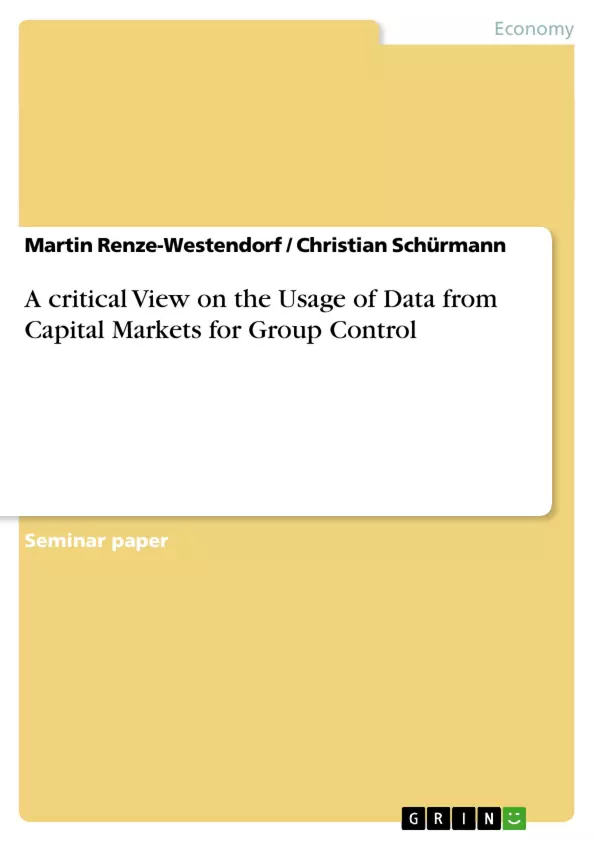Questions in the field of group control are increasingly important in today’s economic environment. This development is especially driven by the fact that almost 90% of the German public companies and around 50% of the German limited liabilities companies are organized as groups. These structures imply information asymmetries and higher coordination requirements because commonly the parent company is responsible for strategic decisions while the subsidiary is responsible for the operations. As decentralized structures are gaining importance and the complexity of the company’s environment is growing, the group control faces new challenges and increasing importance for the management. In its aim to supply rationality assurance to the management it needs to work effective and efficient using a set of control tools. The basic data can be retrieved internally or externally. Especially, in the case of listed subsidiaries the data provided by capital markets seem to be a very simple solution for the problem of information gathering and processing in a complex environment. Hence the following research questions arise: How can a holding control its listed subsidiaries through data from capital markets?
What could be rationality deficits and limitation in the application of data from capital markets? Beginning with basic definitions the paper defines management control to lay the basis of the examination and to determine the point of view. The holding is the entity that group control is located in. Capital market data in group control is the theme of this paper and those two terms need to be defined properly. Group control is defined in respect to rationality assurance, so it must be distinguished between external and internal institutions of rationality assurance. The internal institution includes a description of the functions and tasks of the controller. Control instruments are the tools used by the controller to process capital market data in group control. The main part is assessing the theory of the utilization of capital market data in group control. The first step is to ex-amine the aims of the application of capital market data, which are effectiveness and efficiency. In the second step different forms of application of capital market data in group control are assessed by looking at selected control instruments. They are grouped by their employment in the tasks of the controller, which are information, planning and control, and coordination. [...]
Inhaltsverzeichnis (Table of Contents)
- Introduction
- Problem definition and objectives
- Outline
- Basic Definitions
- Management control defined as rationality assurance
- Holding structures
Zielsetzung und Themenschwerpunkte (Objectives and Key Themes)
This seminar paper examines the use of capital market data for group control in a critical light, particularly focusing on the rationality assurance aspect of management control. The paper aims to provide a thorough understanding of how capital market data can be used to enhance effectiveness and efficiency in group management, while also exploring potential limitations and rationality deficits.
- Rationality assurance as the core principle of management control
- The role of capital market data in group control
- Effectiveness and efficiency considerations in utilizing capital market data
- Different forms of applying capital market data in group control instruments
- Identifying rationality deficits associated with capital market data in group control
Zusammenfassung der Kapitel (Chapter Summaries)
- Introduction
- The paper introduces the importance of group control in today's economic environment, highlighting the challenges posed by information asymmetry and the need for effective coordination between parent companies and subsidiaries.
- The paper then outlines the key research questions, focusing on how holding companies can control their listed subsidiaries through capital market data and identifying potential rationality deficits associated with this approach.
- Basic Definitions
- This chapter defines management control as the process of ensuring rationality in management decision-making. It explores different approaches to management control, focusing on rationality assurance as a comprehensive framework encompassing both internal and external institutions.
- The chapter then distinguishes between different types of holding structures, including traditional headquarters, financial holding, and management holding, highlighting the varying degrees of management centralization and the different responsibilities held by parent companies in each type.
Schlüsselwörter (Keywords)
This paper explores key themes such as group control, rationality assurance, capital markets, information asymmetry, control instruments, efficiency, effectiveness, and the application of capital market data in management control within holding structures.
Frequently Asked Questions
What is management control in the context of group management?
Management control is defined as the process of providing rationality assurance to management decision-making within complex group structures.
Why is capital market data used for group control?
For listed subsidiaries, capital market data provides a simple and external source of information for gathering and processing data in complex environments.
What are the potential limitations of using capital market data?
Limitations include potential rationality deficits, as capital markets may not always reflect the true operational reality or long-term strategic value of a subsidiary.
What role does the 'holding' play in group control?
The holding is the entity where group control is located, responsible for strategic decisions and coordinating the operations of subsidiaries.
How do information asymmetries affect group control?
Asymmetries occur because parent companies often lack the operational details known to subsidiaries, creating higher coordination requirements and challenges for control.
What are the main tasks of a controller in this framework?
The tasks include information management, planning, control, and coordination to ensure effective and efficient group management.
- Quote paper
- Martin Renze-Westendorf (Author), Christian Schürmann (Author), 2005, A critical View on the Usage of Data from Capital Markets for Group Control, Munich, GRIN Verlag, https://www.grin.com/document/58645



